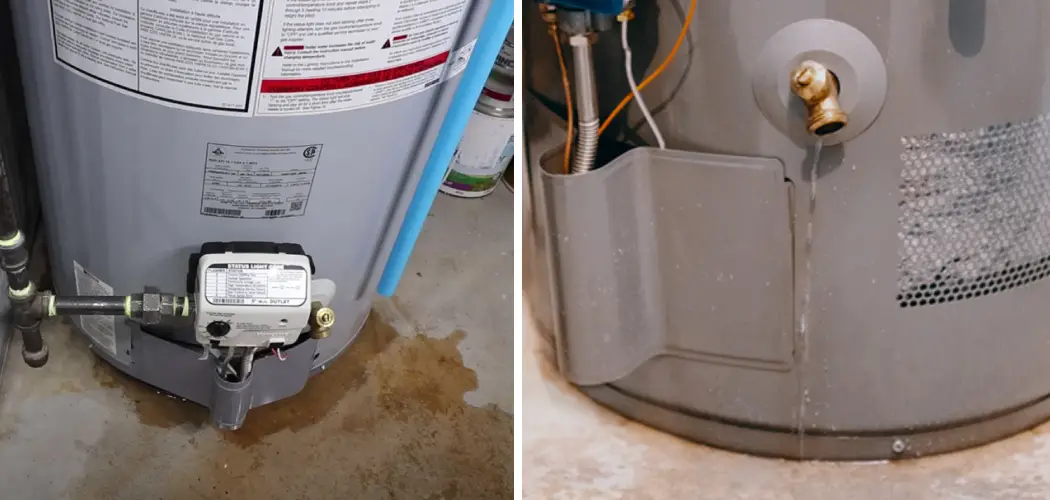Water heaters are essential to any household, providing hot water for daily activities such as showering and washing dishes. However, they can also be a source of headaches if not maintained properly.
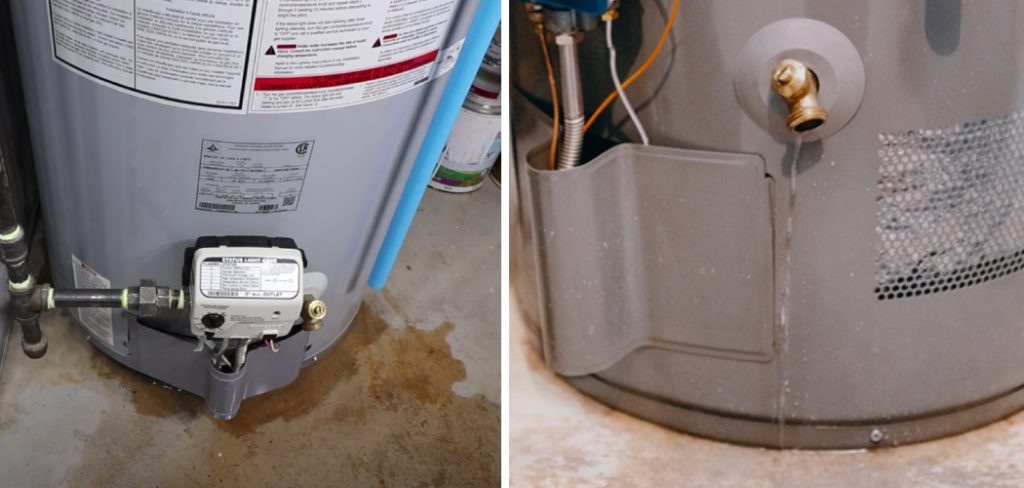
One potential issue that homeowners may face is a leaking water heater. This problem causes inconvenience and can lead to serious damage to your home if left unattended.
In this guide, we will discuss how to know if water heater is leaking and what steps you can take to address the issue. So whether you have a traditional tank water heater or a newer tankless model, read on to learn how to spot a leak and what to do next.
Understanding Water Heater Components
Before we dive into how to detect a leak, it is important to have a basic understanding of the different components of a water heater. This will help you identify where the leak may be coming from and determine the best course of action.
- Storage Tank – Traditional water heaters have a large storage tank where water is heated and stored until needed.
- Pressure Relief Valve – This valve is designed to release excess pressure from the water heater, preventing it from exploding.
- Drain Valve – Located near the bottom of the water heater, this valve drains and flushes out sediment buildup.
- Inlet/Outlet Pipes – These pipes allow cold water to enter the tank and hot water to exit towards your home’s fixtures.
In addition to these components, there may also be a temperature and pressure relief valve, an anode rod, and a heating element, depending on your water heater. Familiarizing yourself with these parts will make it easier to identify potential leaks.
11 Best Ways on How to Know if Water Heater is Leaking
1. Check the Floor:
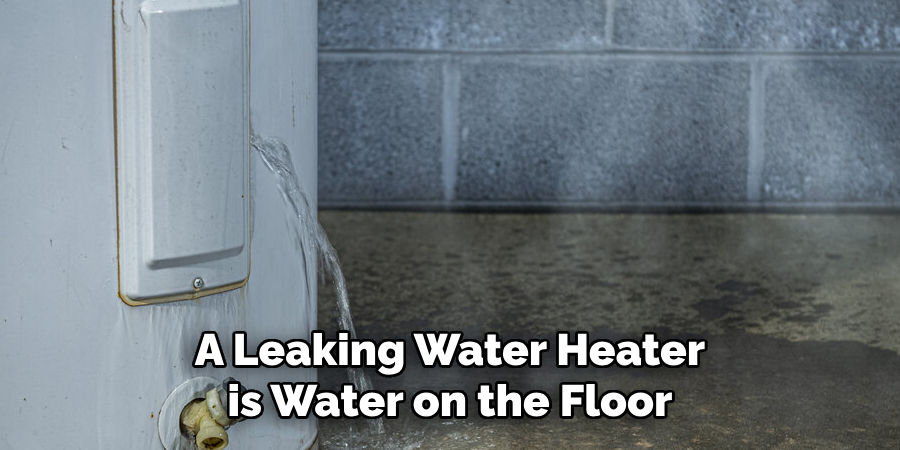
One of the most obvious signs of a leaking water heater is water on the floor surrounding it. This could be due to a leak in the tank itself or from one of the connections or valves.
If you notice any water on the floor, it is important to take immediate action. This could involve temporarily turning off the water heater and calling a professional plumber for repairs.
2. Look for Rust or Corrosion:
Rust or corrosion on the outside of your water heater may indicate that there is a leak or potential for one. This is especially true if the rust is near any connections or valves.
If you notice rust, it is important to have it inspected by a professional as soon as possible. If left untreated, a leak could occur and cause significant damage. This is also a good time to check the age of your water heater, as older units are more prone to leaks and may need to be replaced.
3. Check for Pooling Water:
If you have a traditional tank water heater, checking for pooling water around the base of the tank can help identify a leak. This could occur due to a crack or hole in the tank or a loose connection where water is dripping out.
If you notice any pooling water, it is important to address the issue immediately to prevent further damage. This could involve replacing the tank or tightening any loose connections.
4. Inspect the Pressure Relief Valve:
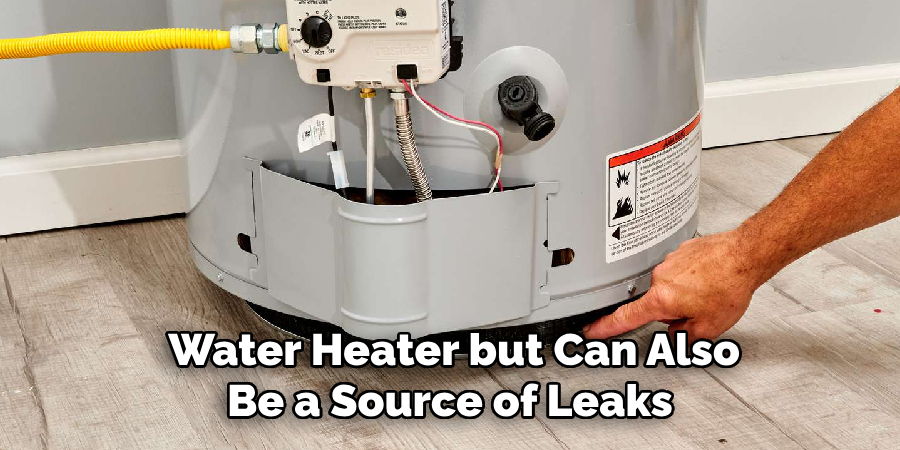
The pressure relief valve is an important safety feature of a water heater but can also be a source of leaks. If this valve is faulty or damaged, it may release excess pressure and cause water to leak out. You can check for leaks by placing a bucket under the valve and opening it manually. If water pours out, the valve may need to be replaced.
5. Look for Drips or Water Stains:
Inspecting the connections and pipes near your water heater can also help identify leaks. Look for any signs of dripping or water stains, as these could indicate a loose connection or a crack in a pipe. It is important to address these issues promptly to prevent further damage and potential flooding. If you need help fixing the issue, it is best to call a professional plumber for assistance.
6. Check the Drain Valve:
The drain valve of your water heater should be checked regularly for any signs of leakage. This valve is responsible for flushing out sediment buildup in the tank, and if it is not functioning properly, a leak may occur.
If you notice any leaks, you can try tightening or replacing the valve if necessary. This is also a good time to flush out any sediment buildup, which can help prevent future leaks.
7. Listen for Strange Sounds:
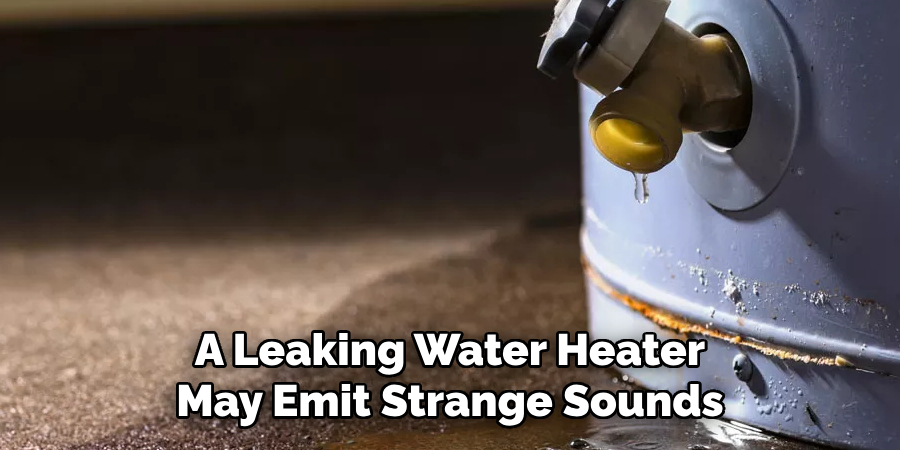
A leaking water heater may emit strange sounds, such as hissing or whistling. This could indicate a pressure issue within the tank or a leak in one of the components. If you notice any unusual noises coming from your water heater, it is best to have it inspected by a professional. Ignoring these sounds could lead to further damage and potential hazards.
8. Pay Attention to Water Temperature:
If you notice that the water temperature in your home is fluctuating or not as hot as usual, this could be a sign of a leaking water heater. A damaged tank or faulty heating element can cause water to leak out, affecting your home’s overall temperature of hot water.
This issue should be addressed immediately to prevent further damage and ensure you have a consistent supply of hot water.
9. Check Your Water Bill:
If your water bill suddenly spikes without explanation, it could be due to a leaking water heater. Even small leaks can add up over time and cause a significant increase in your water usage.
If you notice an unexplained increase in your bill, it is worth checking for any potential leaks in your water heater. If left unchecked, this could end up costing you a significant amount of money in the long run.
10. Look for Mold or Mildew:
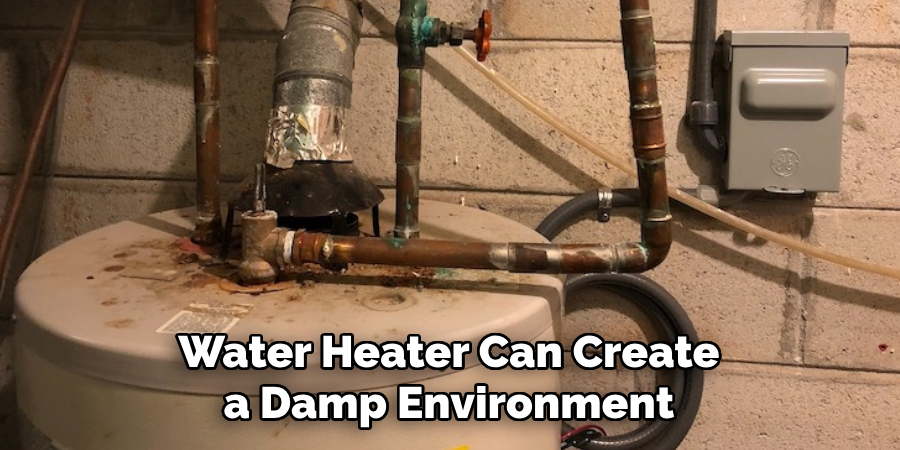
A leaking water heater can create a damp environment, which is the perfect breeding ground for mold and mildew growth. It could be due to a leak if you notice any musty odors or see signs of mold near your water heater.
It is important to address this issue promptly, as mold and mildew can lead to health problems, especially for those with allergies or respiratory issues.
11. Conduct Regular Maintenance:
The best way to prevent leaks in your water heater is by conducting regular maintenance. This includes flushing out sediment buildup, checking connections and valves, and inspecting the tank for any signs of damage.
It is recommended to have a professional plumber conduct an annual inspection and maintenance to ensure your water heater is in good working condition. This can help identify potential issues before they become major leaks, saving you time, money, and hassle in the long run.
Following these tips can help you identify and prevent leaks in your water heater. Remember to always address any issues promptly and seek professional help if you need help fixing the problem yourself.
Regular maintenance and inspections are key to properly functioning your water heater and avoiding costly repairs. Take your time – be proactive in maintaining your water heater to avoid potential leaks. So, make sure to conduct regular maintenance and keep an eye out for any signs of leaks.
Additional Tips and Tricks to Know Water Heater is Leaking
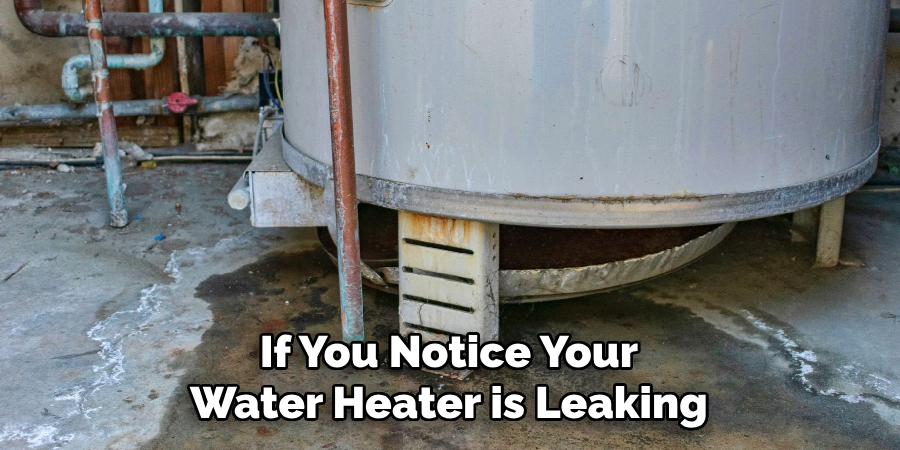
- If you notice your water heater is leaking, it’s important to address the issue quickly before it causes further damage. Here are some additional tips and tricks to know if your water heater is leaking:
- Check the temperature and pressure relief valve (T&P) regularly. This valve releases excess pressure from the tank when it becomes too high, preventing potential explosions. If you notice water leaking from this valve, it could indicate a problem with the pressure inside the tank.
- Inspect the drain valve for any leaks or drips. This is located near the bottom of the tank and is used to empty out sediment buildup. If you see water coming from this valve, it may need to be replaced.
- In some cases, a leak from the water heater may be caused by a loose connection or faulty pipe. Check all visible pipes and connections for any signs of leakage.
- If you have an older water heater, it’s recommended to drain and flush the tank at least once a year to remove built-up sediment and prolong its lifespan.
- If your water heater is in an area with low temperatures, insulating the tank and pipes is important to prevent freezing. Frozen pipes can lead to cracks and leaks in the water heater.
- Make sure to keep the area around your water heater clear of any flammable objects or materials. A leaking water heater combined with a nearby flame or spark can be dangerous.
- If you notice any unusual noises coming from your water heater, it could be a sign of sediment buildup or a failing heating element. It’s best to address these issues early on to prevent further damage and potential leaks.
- Regularly checking for leaks and addressing them promptly can help prevent costly repairs and replacements in the future. Make it a part of your home maintenance routine to inspect your water heater at least every six months.
- In case of a major leak, turn off the water supply to your house and call a professional plumber for assistance. Attempting to fix a large leak on your own can be dangerous and may cause further damage to your home.
Following these additional tips and tricks can help you catch a leaky water heater early on and prevent any potential damage or hazards. Regular maintenance and inspections are key to ensuring your water heater functions properly for years to come.
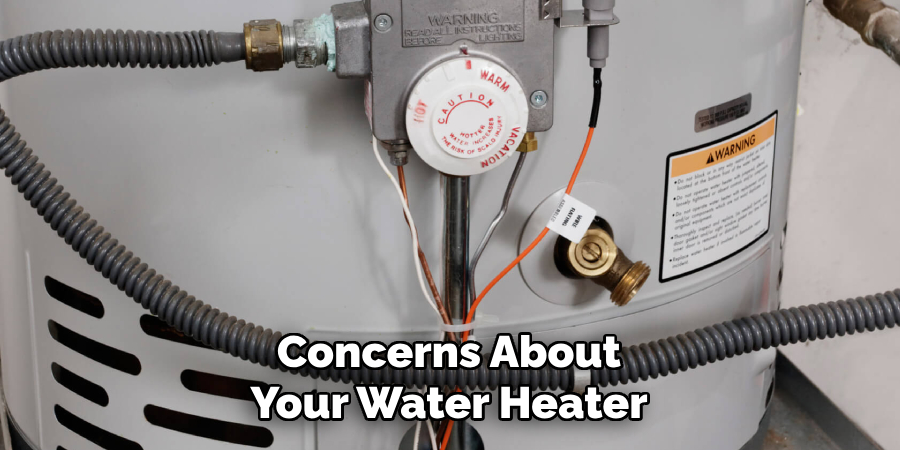
If you have any doubts or concerns about your water heater, it’s always best to consult a professional plumber for advice and assistance. Remember these tips and stay vigilant to protect your home from potential water heater leaks. So, be aware and take necessary actions before it’s too late! Happy plumbing!
Preventative Maintenance Tips for Water Heater Leaking
1. Regular Inspection and Flushing:
One of the best ways to prevent water heater leaks is by regularly inspecting and flushing your water heater. Over time, sediment and mineral buildup can accumulate in your water heater’s tank, causing potential leaks and other issues.
Flushing your water heater at least once a year can remove any built-up debris and keep your unit running smoothly. If you notice any signs of sediment buildup or corrosion during your inspection, it may be time to flush your water heater more frequently.
2. Check for Signs of Wear and Tear:
It’s important to keep an eye out for any signs of wear and tear on your water heater, as these can indicate potential leaks. Look for cracks or rust on the tank, loose connections, and any unusual noises coming from the unit. If you notice any warning signs, it’s best to address them immediately before they become bigger problems.
3. Replace Old or Faulty Parts:
Over time, parts of your water heater may become worn out or faulty, leading to potential leaks. It’s important to regularly check and replace any damaged or worn-out parts, such as the pressure relief valve, heating elements, and anode rod. This will prevent leaks and improve your water heater’s overall efficiency and lifespan.
4. Insulate Your Water Heater:
Insulating your water heater can help regulate its temperature and prevent potential leaks caused by extreme temperature changes. You can purchase a water heater blanket and easily wrap it around the tank to provide additional insulation. This will help prevent leaks and save you money on energy bills. This is especially important for older or poorly insulated water heaters.
5. Keep the Area Around Your Water Heater Clear:
Many people tend to store items around their water heater, which can be a safety hazard and lead to potential leaks. It’s important to keep the area around your water heater clear of any clutter or combustible materials. This will prevent potential leaks and ensure proper ventilation for your unit. If your water heater is in a closet, ensure there is enough space for proper airflow.
6. Call a Professional:
If you notice any signs of water heater leakage or are unsure about the condition of your unit, it’s always best to call a professional. A licensed plumber can inspect your water heater and address any issues before they become bigger problems.
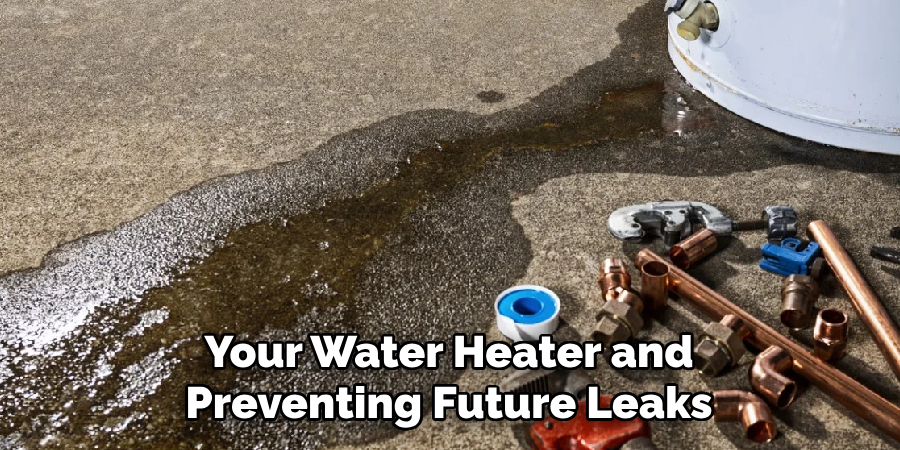
They can also provide expert advice on properly maintaining your water heater and preventing future leaks. So, having a professional check your water heater at least once a year is always a good idea.
Following these preventative maintenance tips can help you avoid water heater leaks and ensure the longevity of your unit. By being proactive and taking care of your water heater, you can save yourself from costly repairs and potential water damage in the future.
Remember to always prioritize safety when it comes to maintaining your water heater, and never hesitate to seek professional help if needed. With proper care, your water heater can continue to provide hot water for your household without any leaks or issues. So, take the time to inspect and maintain your water heater regularly to ensure its optimal performance. Your future self will thank you! Happy maintenance!
Frequently Asked Questions
What Causes a Water Heater to Leak?
There are several reasons why a water heater may start leaking. Some common causes include corrosion, high pressure in the tank, loose connections, and mineral buildup. Corrosion can occur due to the presence of oxygen and moisture, which causes rusting on the tank’s surface.
High pressure in the tank can be caused by thermal expansion or a faulty temperature-pressure relief valve, putting excess strain on the tank’s walls. Loose connections between pipes and fittings can also lead to leaks, especially if they need to be properly sealed. Finally, mineral buildup from hard water can cause cracks and holes in the tank, leading to leakage.
How Do You Know If Your Water Heater Is Leaking?
A few signs can indicate if your water heater is leaking. The most obvious sign is the presence of water near the tank or on the floor surrounding it. You may also notice rust stains or corrosion marks on the tank’s surface.
Another sign is a sudden drop in water pressure or temperature, which could indicate a leak in the tank or its pipes. Strange noises coming from the tank, such as hissing or popping sounds, may also suggest a leak. If you observe any of these signs, it is recommended to inspect your water heater for leaks immediately.
How Can You Fix a Leaking Water Heater?
Fixing a leaking water heater can be a tricky task and should only be attempted by someone with plumbing knowledge and experience. The first step is to turn off the power supply or gas valve to the water heater to prevent any accidents. Next, drain the tank completely and inspect it for any visible holes or cracks.
If the leak is minor, you can patch it up with a sealant or use a specialized epoxy for larger leaks. If the tank is severely damaged and cannot be repaired, it may need to be replaced entirely. It is best to consult a professional plumber for this task to ensure proper installation and safety.
How Can You Prevent Water Heater Leaks?
Regular maintenance and inspections are the best way to prevent water heater leaks. Check the tank’s pressure valve every six months to ensure it works correctly and releases excess pressure.
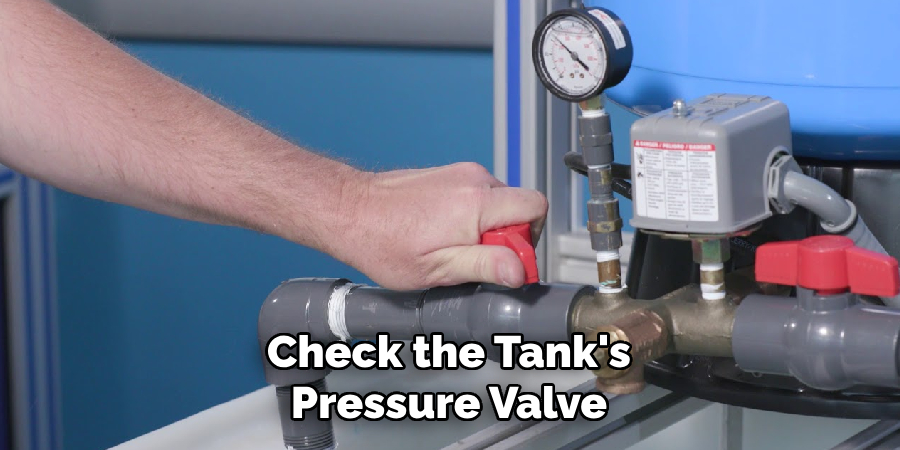
Also, flush the tank at least once a year to remove mineral buildup and sediment that can cause leaks. Replacing the anode rod in your water heater every few years is also recommended, as this component helps prevent corrosion.
Conclusion
All in all, knowing how to know if a water heater is leaking is essential knowledge for homeowners. Being proactive in maintaining your water heater can help prevent leaks and save you from costly repairs or replacements.
Knowing the signs of a leaking water heater and how to fix it is always helpful, but it is best to leave major repairs or replacements to professionals for safety purposes. By following these tips, you can ensure your water heater remains in good condition and provides you with hot water for your daily needs.
So, it is always better to be cautious and take preventative measures to avoid any potential leaks in your water heater. Proper maintenance ensures that your water heater can last many years without any leakage issues.
Therefore, stay vigilant and keep an eye out for any signs of a leaking water heater to address the problem promptly. So, keep checking your water heater regularly and schedule maintenance checks to ensure it continues to function efficiently. As they say, prevention is always better than cure! So, take care of your water heater, and it will take care of you by providing hot water whenever you need it.

